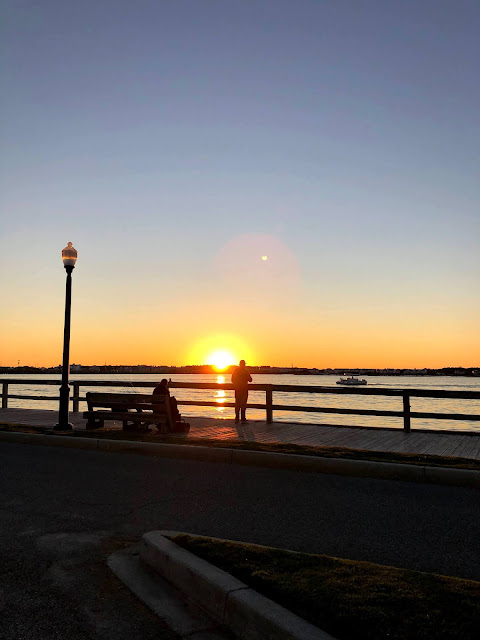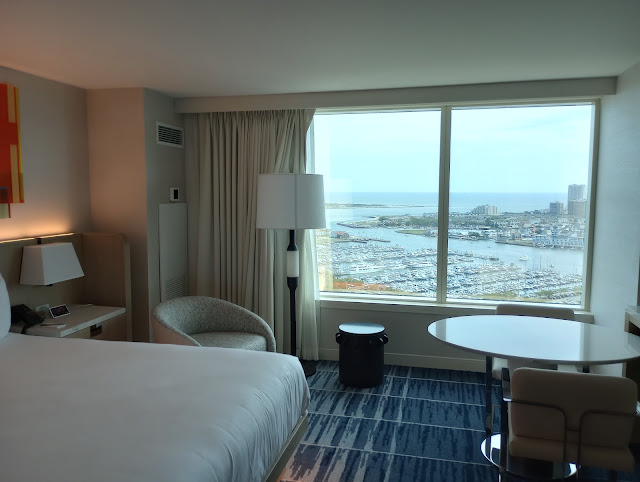 |
| Ocean City, Maryland sunset |
Albert Einstein: “Make things as simple as possible but no simpler.”
My wife and I are recent early retirees at ages 51 and 48. We sold our home during the pandemic (August 2020) to prepare for our early retirement. We had planned on traveling light in our SUV, so we needed to downsize in a hurry. June through August were spent downsizing our personal belongings, which we had accrued over 14 years of living in the state of Pennsylvania.
As we were downsizing, we asked ourselves why downsizing is so difficult. We realized there’s always an emotional attachment tied to personal belongings.
In this post, we’d like to share our thoughts, experiences, and tips on downsizing.
We had always been fascinated by the idea of minimalism. The word minimalism in architecture, art, or music is characterized by extreme spareness and simplicity. When applied to a way of life, it means living with less material possessions. By doing that, you’re freeing up your wealth building tool which is the money you have by not spending!
Too often, we’re working just to buy things we don’t need. This is true whether you’re buying a home, a car, or any other material possession.
No one really needs a 5 bedroom, 5 bath McMansion that costs $800,000 for a family of 4, when a smaller home costing half of that will do. No one really needs to buy a $50,000 SUV for transportation, when a smaller SUV will suffice. And no one really needs the latest smartphone that cost upwards of $1,000, when an older model will work!
In all of these scenarios, the buyers would’ve had to work x number of hours to afford that item.
The buyer of the McMansion, would need to work 80 hours per month, if he made $50 per hour, to finance this house over 30 years. ***Estimating monthly payment of $4,000 on a $800,000 home including taxes and fees. $4,000 divided by $50 = 80 hours.
The buyer of a $50,000 SUV would need to work 18 hours per month if he made the same $50 per hour, to finance this vehicle over 60 months. ***Estimating monthly payment of $900. $900 divided by $50 = 18 hours.
The smartphone buyer would need to work 20 hours if he were to pay for the entire smartphone.
You see where I’m going with this? I’m trying to say everything equates to hourly labor that can be measured. The less you buy, therefore, the less you’ll need to work! Or, put it another way, the less you buy, the more money you’ll have left over, to save for retirement!
It took some time for me to understand what this meant, but I eventually got it myself. I needed to buy less stuff I don’t need, so I won’t need to keep working as hard! It was a definite eureka moment.
From that point on, we spent less and less. There’d be less shopping trips for clothing, cosmetics, and CD’s / DVD’s.
We’d stopped going to shopping malls just to walk around, looking to kill time on the weekends...Buying less freed up money which we used to put away for retirement.
Even with us not buying NEW stuff, it still left sizable amount of old stuff we had purchased up until that time. We had printed photos from high school, college, wedding, trips, family, etc., plus files from 20 + years ago! There were cards we had given each other throughout the years (Valentines Day, Christmas, birthdays, etc.). There were sentimental gifts from each other, from family/friends, and to our dog, Toby.
These were what we consider the ‘emotional attachment’ belongings. We needed to figure out what to do with these as we weren’t moving to another house or a rental. Everything (or almost everything) had to go...
***Note: For those of you that don’t know, we currently do not have a ‘home’ (purchase or rental) of our own. We’ve been traveling for the most part, or we’ve been staying with our family.
Other possessions were less difficult but equally time consuming to get rid of. These were things like furniture, clothes we no longer wore, books, CD’s/DVD’s, kitchen tools, etc...
Please see our tips and observations on how to downsize:
- Toughest ones to get rid of are the emotional belongings
When it has an emotional connection behind it, it’s really hard to let go...That gift from a departed family member, or something that grandparents gave you as a child is tough to let go. It helps to take some of these really sentimental items with you, but not most.
There’s a freedom to letting go of your stuff. Most of these stuff were just gathering dust month after month. We haven’t looked at them in years...The selling of our home and needing to travel light, gave us the impetus we needed to let go and be free...
For photos, we decided to take a photo of a printed photo to upload to Google Photos. We kept some printed photos we really liked...We realized we weren’t looking at photos often anyway. For cards, we only kept the important ones, but threw out the rest. Some cards, we took photos, then uploaded to Google Photos.
The gifts from family/friends were handled the same way. Kept only few really important items, but gave away most. We inevitably went back and forth deciding what was really important for both of us. Communication was key yet again. You should always talk it through.
Verdict: We managed to whittle down all emotional belongings to just one small shoe size box.
We must have shredded like 20 garbage bags worth of documents. We only kept our tax returns for few years. All the others like credit card statements, utility bills, and receipts from 10 years ago, we shredded. We knew we can always get statements from our credit card companies if we needed to...
Verdict: Just one Manila folder for tax returns.
- Furniture/books/CD/DVD/PlayStation
We found a buyer for our furniture and made some money on these. Books/CD/DVD/PlayStation we donated to charity.
Verdict: Successfully downsized!
- Kitchen stuff, garage stuff, decorations, and other knickknacks
We donated most of these, and sold some of these. I would say we got back less than 5% of the money we spent to buy these brand new...(Ouch!)
Verdict: We kept one box worth of kitchen stuff we needed to use ourselves. We kept 2 of each of the following items: cups, plates, forks, and spoons. We kept few other kitchen stuff like a knife, scissors, coffee pot, tea maker, and few other items.
These were tougher to get rid of as we still needed clothes and shoes. What we did do, was to donate clothing and shoes we didn’t wear much or recycled old ones. We donated jackets (kept three but not all 15 of them), and shoes (my wife had lots of shoes!; I kept about 7 pairs and my wife kept about 15 pairs).
Verdict: This was the toughest ones to get rid of in my opinion. We didn’t want to buy them if we didn’t have them, so we kept the ones we thought we needed...
Not as successful downsizing compared to others. We whittled down clothes/shoes to about 6 suitcases worth. These items are really the majority of our personal stuff right now.
- Toby (our Pomeranian dog) stuff
Toby had way too many toys, costumes (Mickey Mouse, Halloween, Christmas, devil, bumblebee, etc., thanks to his mommy!), and a bed he no longer used. We donated all these to a nearby animal shelter.
Verdict: Very successful! We now have one bag worth of Toby’s stuff and his bed!
All in all, I think we did a good job of downsizing. We can now fit all of our belongings into our SUV. I think we reduced our stuff down to about 10% of what we had...
In conclusion:
Downsizing and living a minimalist lifestyle is not easy for most people. Those who have done it have enjoyed the freedom that comes from living simply with less material possessions.
We found it interesting how much money we had left over when we stopped buying stuff to fill our large home. This realization to not buy stuff we don’t need, had a huge consequence for our path to financial independence.
The rampant consumerism that is the backbone of American economy has a toll on most people who can’t afford these exorbitant prices for such items, but buy them anyway, on credit. The moment we are conscious of our spending and learning to live simply, is when we start to make great strides in our path to financial independence.
Thank you all for reading!
Jake
Wandering Money Pig
If you missed the post ‘What’s it like to hand in your resignation...’, please click
here.
If you missed the post ‘How to retire early...’, please click
here.
If you missed the post ‘We sold our home during the pandemic...’, please click
here.
If you missed the post ‘What is the FIRE (financial independence retire early) movement...’, please click
here.
If you missed the post ‘Magic of compounding interest...’, please click
here.
If you missed the post ‘Our minimalist update…’, please click
here.
If you missed the post ‘Dangers of entitlement on your path to happiness…’, please click
here.
If you missed the post ‘Get rid of debt to reach your goal of financial independence…’, please click
here.
If you missed the post ‘Thinking of moving to Pennsylvania…’, please click
here.
If you missed the post ‘Learn to say enough to be happy on your path to financial independence and to retire early…’, please click
here.
If you missed the post ‘Why is downsizing/minimalism so difficult…’, please click
here.
If you missed the post ‘Is America still a land of opportunity…’, please click
here.
If you missed the post ‘Learn a skill that pays you well to retire early…’, please click
here.
If you missed the post ‘Invest and not save for retirement…’, please click
here.
If you missed the post ‘Learn to enjoy the moment for life and for FIRE…’, please click
here.
If you missed the post ‘The correlation between consumerism and early retirement…’, please click
here.
If you missed the post ‘Retire on $200,000 (200k)…’, please click
here.
If you missed the post ‘Adapting to change for life and for FIRE…’, please click
here.
If you missed the post ‘Thinking of moving to Hawaii…’, please click
here.
If you missed the post ‘Tough childhood leads to success in later life…’, please click
here.
If you missed the post ‘Thinking of moving to New York City…’, please click
here.
If you missed the post ‘Importance of finding purpose in early retirement…’, please click
here.
If you missed the post ‘What is the rule of 72…’, please click
here.
If you missed the post ‘Retire on $100,000 (100k)…’, please click
here.
If you missed the post ‘The importance of a significant other’s role in your path to FIRE…’, please click
here.
If you missed the post ‘Save for retirement or pay off debt…’, please click
here.
If you missed the post ‘How much do I need to retire…’, please click
here.
If you missed the post ‘Early Retirement Manifesto…’, please click
here.
If you missed the post ‘Pros and cons of early retirement…’, please click
here.
If you missed the post ‘How to save money when traveling…’, please click
here.
If you missed the post ‘What is the average 401k balance…’, please click
here.
If you missed the post ‘Doing a garage sale during the pandemic…’, please click
here.
If you missed the post ‘First few months after early retirement…’, please click
here.
If you missed the post ‘Not caring too much equals happiness…’, please click
here.



